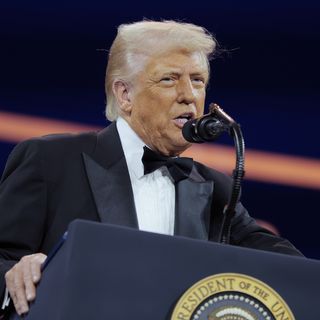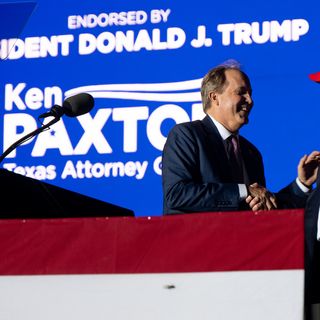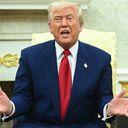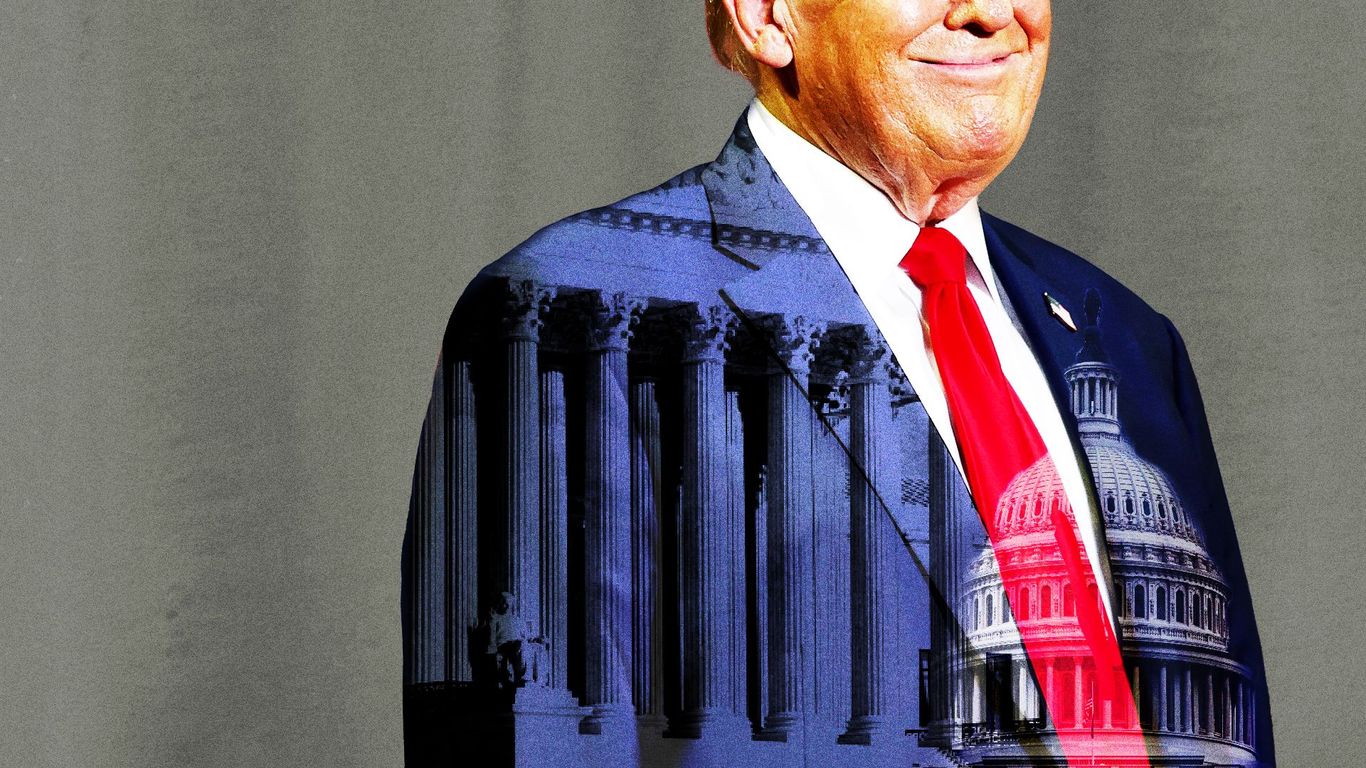Reading view
Max Homa Drops Stunning Revelation amid Split with His Caddie
Trump savages "rebel" Republicans trying to quash his tariff powers
President Trump on Tuesday ripped into Republican members of Congress who are trying to give Congress the ability to block him from unilaterally instituting tariffs.
Why it matters: The president's remarks during a speech to the National Republican Congressional Committee laid bare divisions within the GOP over the administration's hardline protectionist trade policies.
- At least a dozen House Republicans are considering supporting Rep. Don Bacon's (R-Neb.) bill to sunset a president's tariffs after 60 days unless Congress passes a resolution of approval, Axios reported Tuesday.
- In the Senate, more than half a dozen Republicans have signed onto Sen. Chuck Grassley's (R-Iowa) and Maria Cantwell's (D-Wash.) version.
What he's saying: "I see some rebel Republican, some guy who wants to grandstand, say, 'I think that Congress should take over negotiations.' Let me tell you, you don't negotiate like I negotiate," Trump said.
- "I just saw it today, a couple of your congressmen sir," Trump continued, pointing into the crowd, "'I think we should get involved in the negotiation of the tariffs.' Oh that's what I need, I need some guy telling me how to negotiate."
- Trump said the chatter on Capitol Hill about restraining his tariff powers "hurts your negotiation," adding: "And then the fake news wants to build it up, and it has no chance anyway."
Between the lines: Some of the more free trade-minded Republicans on Capitol Hill have watched uneasily this weak as the stock market lurched in response to Trump's across-the-board tariffs.
- House Democrats are hoping to further drive a wedge between Trump and his party in Congress by forcing a vote on ending his sweeping new levies.
- Trump has threatened to veto Bacon's bill if Congress were to pass it — something several Republicans have cited in explaining their refusal to co-sponsor it.


Rory McIlroy Delivers Raw Response to Masters Media
Is 76ers Coach Nick Nurse on Hot Seat After Missing Playoffs?
Trump triples tariff that would affect Shein, Temu packages
The Trump administration, which already closed a trade loophole that allowed cheap goods from China to avoid tariffs, is now tripling the planned levy.
Why it matters: Packages valued at less than $800 have enjoyed the "de minimis" exemption from added duties, which has enabled foreign online retailers like Temu and Shein to sell super-cheap items to American consumers.
Follow the money: Trump las week signed an executive order ending the loophole on shipments from China beginning May 2.
- The president had briefly suspended the duty loophole in the early days of his second term, before restoring the exemption while the Commerce Department put together a plan to "fully and expediently process and collect tariff revenue."
- The Commerce Department has since declared that "adequate systems are in place to collect tariff revenue" on low-value international shipments.
Zoom in: Applicable duties will be attached to shipments under $800 that are sent from China to the U.S. outside of the international postal system, according to the White House.
- Shipments under $800 that are sent through the international postal network were originally to be "subject to a duty rate of either 30% of their value or $25 per item (increasing to $50 per item after June 1, 2025)."
- But the White House tripled those levies on Tuesday — 90% of their value, or $75 (rising to $150 after June 1), citing the retaliatory tariffs imposed by China's government.
Threat level: Critics of the de minimis exemption say it has bludgeoned U.S. businesses, such as fashion retailer Forever 21, which recently began liquidating its U.S. stores after partly blaming the rise of Shein and Temu for its downfall.
- "The ability for non-U.S. retailers to sell their products at drastically lower prices to U.S. consumers has significantly impacted the Company's ability to retain its traditional core customer base," Forever 21 co-chief restructuring officer Stephen Coulombe said in a court filing.
The other side: Free market think tank Cato Institute argued that eliminating the de minimis exemption means "effectively raising taxes on American consumers and dramatically increasing shipping times."
- Representatives from Temu and Shein have not previously responded to Axios requests for comment on the de minimis issue.


I lived overseas in my 20s and 30s. Now, in my 40s, I'm learning that there's value in staying put.
Becky Martin
- Becky Martin and her partner moved to Taiwan in their 20s in search of adventure and to pay off student loans.
- A few years later, they returned home to Canada, only to realize they wanted to move to Taiwan permanently.
- In their 40s, their thinking again shifted, and they realized the draw of family was calling them back home.
Seeking adventure and needing to pay off student loans, I moved to Taiwan in my early 20s.
I was complaining about my debt when a friend mentioned that teaching English abroad could be a good way out. My job as a child and youth worker in Canada was not covering the bills. I convinced my then-boyfriend to join and we spent the next two and half years teaching kindergarten and elementary students in Taiwan
But after fiscal success, having achieved our goal, we decided to move back to Canada. Returning home in my mid-20s with an inflated ego after a few years of easy money, a comfortable life, and a level of respect as an English teacher proved to be a hindrance to my success in Canada.
We lost a lot of our savings in the time it took us to set up our lives again. We struggled to find jobs in Canada that paid enough to meet living expenses and ended up moving four times between cities. We found ourselves once again in a financial hole that was becoming deeper with every passing year.
Seeking security in Taiwan
So, 6 years later, after getting married, we returned to Taiwan in 2009, this time, our plan was to relocate permanently.
I spent most of my 30s, the next 7 and a half years, in Taiwan teaching English.
I loved the job, the lifestyle, having financial security, the opportunity to travel, designing my dream apartment, and eventually, adopting three cats.
However, even though we were building a good life in Taiwan, it didn't negate the fact that a significant part of our life was back in Canada, our family.
While living in Taiwan, my father-in-law died suddenly of a heart attack, and our world tilted. We went home to mourn with my husband's family but realized two weeks was an insignificant amount of time to process such a loss.
Just over a year later my nephew passed away on his school playground at recess. He was 8 years old and I had spent 7 years in Taiwan. I had met him only a few times in his short life.
Suddenly, the money, the pretty apartment, and the beautiful view no longer held us captive.
My husband and I starkly began to understand that the distance between us and our family meant that we could not really be a part of each other's lives. We could not be there to grieve, celebrate, or share.
Home was calling
We've now been back in Ontario, Canada for almost 8 years. I'm involved in my nieces and nephews' lives and I take time to travel with my sisters. My five brothers are no longer strangers to me. I've been able to visit my only living grandparent many times since I've been back — she's in her mid-90s. I see family almost every month now for holidays or sometimes just to get together.
At 46, after starting over in Canada again, changing careers, and dealing with the rising cost of living, I doubt that we'll ever be financially comfortable again. We'll probably never own a house, buy a new car, go on fancy vacations, or have a comfortable retirement.
But it's all worth it to watch my nieces and nephews grow into adults. I also have time for intimate conversations with my siblings during car rides or while hiking nearby.
I found grand adventures out there — lessons and insights that came when I stripped away everything familiar and influential. Growth happened when I pushed beyond my boundaries and realized the only limits were the ones I had created.
I also came to see the tremendous value in sometimes staying put.
Braves Receive Update On Reynaldo López Following Arthroscopic Surgery
Kenya Moore Slams Andy Cohen's Radio Co-Host for 'Sexual Assault' Comment
Ken Paxton Announces Senate Bid, Sets Up Texas GOP Battle With John Cornyn
Inside the Death Chamber as Florida Executes Convicted Killer Michael Tanzi
Analysts Overwhelmingly Predict Cowboys Will Draft Offensive Star at No 12
How to Watch Tigres UANL vs LA Galaxy: Live Stream Concacaf Champions Cup, TV Channel
Calvin Booth Breaks Silence on Being Fired by Nuggets
Scoop: Ken Paxton hires consultants for 2026 Texas Senate primary
Texas Attorney General Ken Paxton has hired the prominent Republican consulting firm Axiom Strategies to run his primary campaign against GOP Sen. John Cornyn, according to people familiar with the matter.
Why it matters: Paxton's challenge of the four-term senator — which he announced Tuesday on Fox News — is expected to be the GOP's most expensive primary in 2026.
- Paxton has tapped Nick Maddux, who served as the chief political adviser in his 2022 campaign, to run his primary challenge.
- Sam Cooper, another Axiom consultant, is expected to lead an outside effort to elect Paxton.
- Jeff Roe, the firm's founder, will not be personally involved, according to sources familiar with the planning. Axiom has long worked for Texas Sen. Ted Cruz as well as Paxton.
The intrigue: Roe is among the party's most controversial political operatives and is in a feud with Trump's 2024 co-campaign manager, Chris LaCivita.
- Trumpworld's disdain for Roe dates back to the 2024 Republican primary, when Roe ran an outside group backing Florida Gov. Ron DeSantis.
- Four days ago, Tony Fabrizio, Trump's pollster, used the news that Axiom was laying off 10% of its workforce to mock Roe.
Zoom out: The Republican party is bracing for a slugfest in Texas, with two state-wide elected officials, both with deep fundraising networks, preparing to go toe-to-toe in a state Trump won by 14 percentage points in November.
- Tim Scott, the chair of the National Republican Senatorial Committee, has pledged that his organization will support GOP incumbents.
- But he has vowed to stay in close consultation with Trump on the best way to avoid nasty intra-party fights.
- "We want to make sure that the president and I are on the same page on these issues," Scott told Axios last month.


Celtics vs Knicks Injury Report: Jayson Tatum, Jalen Brunson Statuses Revealed
Lakers Injury Report: LeBron James, Luka Doncic Statuses Revealed vs. Thunder
China Reacts to Pete Hegseth's Panama Canal Remarks
Supreme Court comes to Trump's rescue in multiple rulings
The Supreme Court is clearing away many of the speed bumps lower courts have put in President Trump's path.
The big picture: The court said Tuesday the administration does not have to comply with a lower-court order directing it to rehire thousands of fired federal workers.
- The justices on Monday night lifted a judge's order prohibiting the administration from using the Alien Enemies Act to deport suspected criminals en masse.
- They also allowed the administration to proceed with a plan to freeze funding for teachers.
- And Chief Justice John Roberts granted the Justice Department's request for more time to litigate whether the U.S. must return a man who was deported due to an administrative error.
Between the lines: The Supreme Court's interventions have been narrow, procedural and temporary.
- None of them are rulings on the underlying merits of any big legal questions, and the legal battles over just about every element of Trump's second-term agenda are still raging.
- But even temporary wins are still wins. Letting the White House carry out its policies is no small victory, especially when you consider just how many of those policies lower courts have blocked.


These companies — or their leaders — donated to Trump's inauguration. Here's how much their share prices have dropped since then.
SHAWN THEW/via REUTERS
- Tech and finance stocks plunged after Trump's tariff announcement on April 2.
- Trump's plan includes a blanket 10% tariff and additional tariffs for some countries.
- The downturn affected CEOs of Apple, Amazon, Google, Meta, Tesla, Uber, Goldman Sachs, and Oracle.
After making high-dollar donations and, in some cases, appearing at President Donald Trump's 2025 inauguration, billionaire tech and finance CEOs are watching their companies' stocks plunge.
Since Trump's April 2 "Liberation Day" announcement of a 10% blanket tariff on all countries, on top of additional tariffs on certain countries, the stock market has experienced heavy losses in a matter of days.
Here is how much eight companies lost in share value since Trump's inauguration day as of market close on Tuesday, April 8, 2025, according to Yahoo Finance.
Apple
SHAWN THEW/via REUTERS
Percentage of share decline since January 21: -23%
Tim Cook, CEO of Apple, personally donated $1 million to Trump's inaugural committee and attended the ceremony.
Trump took credit for Apple's plans to spend and invest more than $500 billion in the US over the next four years.
Amazon
Saul Loeb/via REUTERS
Percentage of share decline since January 21: -26%
Jeff Bezos, the founder and executive chairman of Amazon and founder of Blue Origin, praised Trump for an "extraordinary political comeback and decisive victory" after Trump won the election.
Amazon donated $1 million to Trump's inauguration committee, and Bezos also attended the inauguration.
Julia Demaree Nikhinson/USA TODAY Sports via Reuters Con
Percentage of share decline since January 21: -27%
Google donated $1 million to Trump's inauguration fund.
In addition to attending Trump's inauguration, Sundar Pichai, Google's CEO, also congratulated Trump on his election win and said, "We are in a golden age of American innovation."
Meta
Evelyn Hockstein/REUTERS
Percentage of share decline since January 21: -17%
Meta, the parent company of Facebook and Instagram, donated $1 million to Trump's inauguration fund.
Meta CEO Mark Zuckerberg attended the inauguration.
Uber
REUTERS/Anushree Fadnavis
Percentage of share decline since January 21: -4%
Uber and its CEO, Dara Khosrowshahi, each donated $1 million to Trump's inaugural fund.
After Trump's election win, Khosrowshahi took to social media to congratulate Trump "on a resounding victory."
Goldman Sachs
Mike Segar/REUTERS
Percentage of share decline since January 21: -27%
Goldman Sachs donated an unspecified amount to Trump's inauguration fund. It also removed a section about diversity and inclusion in its annual filing earlier this year, in line with Trump's crackdown on DEI policies.
David Solomon, Chairman and CEO of Goldman Sachs, previously praised Trump on the Fox Business Network for being "engaged with the business community."
Other notable business leaders who have donated in some way to Trump — though not specifically to his inauguration — are Tesla's Elon Musk and Oracle's Larry Ellison.
Tesla
Mike Segar/REUTERS
Percentage of share decline since January 21: -48%
Tesla CEO Elon Musk donated at least $260 million to put Trump back in the White House. Musk and his PAC also spent at least $12 million on the Wisconsin Supreme Court election to support a conservative candidate, who eventually lost.
Tesla's diminished share value comes after not only tariff and recession fears but also a widespread protest movement against his company and involvement in the White House DOGE office.
One Telsa fan called the carmaker's decline in sales "brutal," and branding experts have said it would take significant concessions from Musk to rebrand Tesla. Musk himself said that running his businesses while working closely with the White House hadn't been easy.
Oracle
Carlos Barria/REUTERS
Percentage of share decline since January 21: -28%
Oracle's cofounder and chairman, Larry Ellison, was one of the few top technology executives to openly support Trump back in 2020. He hosted a fundraiser for Trump at his Rancho Mirage estate in California in February 2020.
Ellison, Sam Altman of OpenAI, and SoftBank's Masayoshi Son are also spearheading Project Stargate, a $500 billion AI infrastructure initiative supported by Trump.
Meta, Google, Oracle, Tesla, Amazon, Apple, Goldman Sachs, and Uber did not immediately respond to requests for comments.